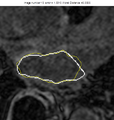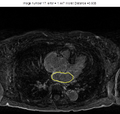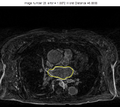Difference between revisions of "Projects:TopologicalSegmentation"
(Created page with '= Segmentation = Catheter ablation has been proposed for treatment of atrial fibrillation arrhythmia. MRI data, obtained at University of Utah, are used to explore lesion ablat…') |
m (→Our Approach) |
||
| Line 18: | Line 18: | ||
most appropriate features, and to compare the results to expert’s manual segmentation. | most appropriate features, and to compare the results to expert’s manual segmentation. | ||
| − | Based on the obtained edge or ridge features, we are | + | Based on the obtained edge or ridge features, we are using two different approaches to create a contour. |
The first uses a novel boundary linking algorithm where all the detected ridges converted to 8-point extrema vector, | The first uses a novel boundary linking algorithm where all the detected ridges converted to 8-point extrema vector, | ||
| − | and then the connections between ridges are made using these vectors. The second approach uses active contours to provide smoother results. | + | and then the connections between the ridges are made using these vectors. The second approach uses active contours to provide smoother results. |
== Results == | == Results == | ||
Latest revision as of 17:42, 21 November 2012
Home < Projects:TopologicalSegmentationContents
Segmentation
Catheter ablation has been proposed for treatment of atrial fibrillation arrhythmia. MRI data, obtained at University of Utah, are used to explore lesion ablation and scarification locations. In addition, MRI analysis may help to predict if the ablation procedure will help a patient or not. Many of these image analysis tasks are largely based on segmentation of left atrial wall, which is done manually or semi-automatically. Automatic segmentation uses moving contours or surfaces (interfaces) to segment image data by minimizing a predefined energy function. These moving interfaces are highly affected by image data, which can be thought as a force field pushing the interface to features of choice. Thus, the choice of interface attracting image features is critical.
Our Approach
We are exploring different image features that are appropriate for such automatic segmentation tasks. Our objective is to develop and improve topological extrema ranking algorithms (e.g., maximum persistence, and perceptual ridge importance) to provide the most appropriate features, and to compare the results to expert’s manual segmentation.
Based on the obtained edge or ridge features, we are using two different approaches to create a contour. The first uses a novel boundary linking algorithm where all the detected ridges converted to 8-point extrema vector, and then the connections between the ridges are made using these vectors. The second approach uses active contours to provide smoother results.
Results
The example of extracted ridges is shown in the Figure 1. The connected boundary is shown in the Figure 2. For the tested volumes, when comparing the obtained boundary with expert's manual segmentation, the average distance error is about 2 pixels. The results of GVF active contour approach are shown in the Figures 3-5. The bright gray contour is the expert's segmentation, and yellow contour is the result of our algorithm. The average distance error there is less than 2 pixels.
Project Week
Publications
Nakhmani A., Tannenbaum A., "Automatic Segmentation of Left Atrium Wall Using Topologically Significant Edge Features," In preparation.
Key Investigators
- UAB: Arie Nakhmani and Allen Tannenbaum




